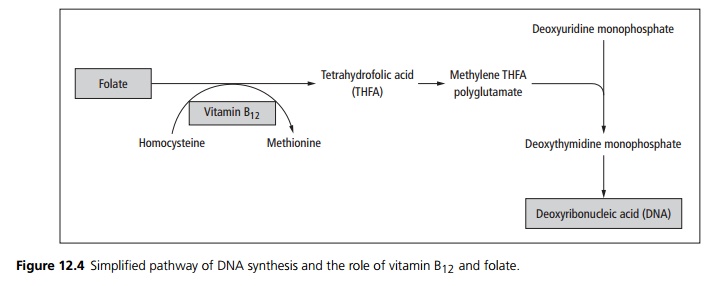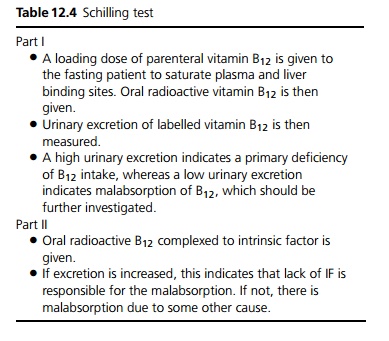Chapter: Medicine and surgery: Haematology and clinical Immunology
Vitamin B12 deficiency - Macrocytic anaemia
Vitamin B12 deficiency
Vitamin B12 deficiency
Definition
Deficiency of vitamin B12 (cobalamins) causes macrocytic megaloblastic anaemia.
Aetiology
Low intake occurs in vegans and chronic alcoholics. Vitamin B12 is found in animal products such as liver, kidney, fish, red meats, eggs and cheese. Increased requirements occur in pregnancy and haemolysis.
Malabsorption may occur in pernicious anaemia (see below), terminal ileal disease (e.g. Crohn’s disease), pancreatic failure and following gastrectomy or small bowel resection.
Pathophysiology
Vitamin B12 is absorbed mainly in the terminal ileum, by binding to intrinsic factor (IF) secreted by gastric parietal cells. There is 3–4 years supply stored in the liver. Vitamin B12 is involved in nucleic acid synthesis (see Fig. 12.4). It also controls fatty acid synthesis in myelin sheaths of nerves.

Clinical features
In addition to symptoms of anaemia, patients with vitamin B12 deficiency may have neurological complications such as peripheral neuropathy, optic atrophy, subacute combined cord degeneration and dementia.
Investigations
The diagnosis is made by serum B12 levels. The Schilling test is used to identify the cause of the deficiency (see Table 12.4). Gastrointestinal endoscopy can be used to demonstrates gastric atrophy and achlorydia. Intrinsic factor antibodies can be detected in the serum of 50% of patients with pernicious anaemia as the cause.

Management
Treatment is by vitamin B12 replacement, which may be given orally if due to dietary insufficiency or intramuscularly if due to malabsorption. Complications of treatment include hypokalaemia, gout and the un-masking of iron deficiency.
Related Topics